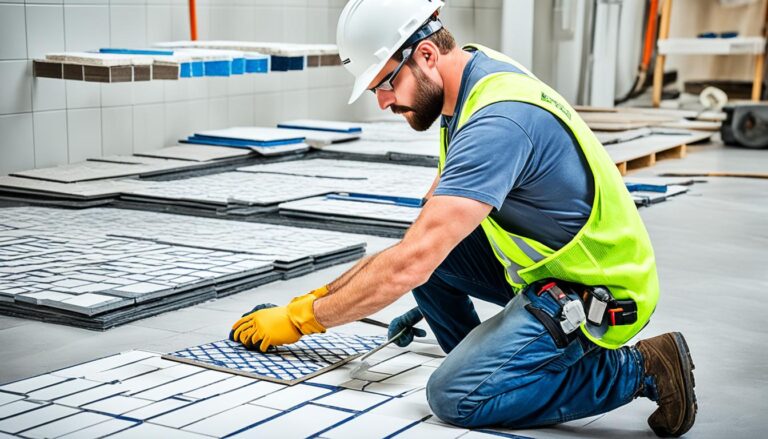Thinking about remodeling your home or starting a construction? Choosing the right general contractor is key.
What should you look for? And how do you make the best choice?
This guide aims to answer these questions.
We’re here to help you with everything about hiring a general contractor. You’ll learn what they do and how to find the perfect one for you.
We’ll explore all aspects of the hiring process.
Key Takeaways:
- Choosing the right general contractor is crucial for the success of your project.
- Consider the contractor’s qualifications, experience, and reputation before making a decision.
- Ask the right questions and go through a thorough contractor selection process.
- Ensure the contractor has the necessary licenses, permits, and insurance.
- Take your time and do thorough research to find the best general contractor for your needs.
What is a General Contractor?
A general contractor, or GC, leads on big building jobs. They ensure projects go smoothly from start to finish. This is vital for success.
They oversee the whole project and are the go-to for clients. General contractors manage many tasks. This includes hiring subcontractors, buying materials, and getting permits.
They’re part of all construction phases, from planning to completion. Working with architects and designers, they ensure the project is safe and meets standards.
With strong coordination skills, they understand building processes well. They tackle the challenges of constructing homes, commercial spaces, and infrastructure.
As the main point of info, they keep everyone updated. Their tasks include project and financial management and ensuring quality.
“A general contractor is like the conductor of an orchestra, bringing together various skilled professionals and ensuring that they work in harmony to create a successful construction project.”
Responsibilities of a General Contractor
The tasks of a general contractor can vary. It depends on the project’s size and complexity. But, they often do the following:
- Project planning and management
- Procuring materials and equipment
- Hiring and supervising subcontractors
- Obtaining necessary permits and licenses
- Coordinating with architects and designers
- Ensuring compliance with building codes and regulations
- Managing project budgets and finances
- Monitoring progress and resolving issues
- Ensuring the project is completed on time and within budget
- Maintaining high standards of quality and craftsmanship
A talented general contractor balances many duties with skill. They face construction challenges head-on, solve problems, and make smart choices. This helps them deliver successful projects.
What Makes a Great General Contractor?
A great general contractor is crucial for a construction project’s success. They have key qualities that make them stand out. Let’s explore what makes a general contractor great:
- Communication: They excel in keeping everyone in the loop. A great general contractor ensures your voices are heard and your concerns are met.
- Realism: They are real about budgets and schedules. You get honest cost estimates and timelines, right from the start.
- Agility: They handle surprises well. When unexpected issues pop up, a top contractor smoothly adjusts plans to keep things moving.
- Eye for Detail: They focus on the small stuff with great pride. Their attention ensures every part of the project is done perfectly.
- Tidiness: They keep the site clean, which is key for safety and efficiency. A clean work environment also protects your property.
Choosing a great general contractor with these traits guarantees your construction project will go smoothly and successfully.
| Qualities | Description |
|---|---|
| Communication | Excellent communication skills, ensuring effective collaboration and understanding. |
| Realism | Honest budgeting and accurate timeline management to set realistic expectations. |
| Agility | Ability to adapt and find creative solutions in the face of unforeseen challenges. |
| Eye for Detail | Meticulous attention to detail, ensuring high-quality craftsmanship. |
| Tidiness | Prioritization of a clean and organized work environment, protecting your property. |
Typical Remodeling Projects
If you’re thinking of remodeling your home, getting a general contractor is a smart move. These experts have the know-how for both tiny changes and big makeovers. Here are some common projects where a general contractor’s skills shine:
| Project | Description |
|---|---|
| Kitchen Renovation | Updating and upgrading the kitchen, including new appliances, cabinets, countertops, and flooring. |
| Bathroom Remodel | Renovating the bathroom to improve functionality and aesthetics, such as installing new fixtures, tiles, and vanity. |
| Basement Finishing | Converting the basement into usable living space, such as a home office, guest suite, or additional living area. |
| Deck Addition | Building a new deck or expanding an existing one to create an outdoor living and entertainment area. |
| Home Remodeling | Comprehensive renovation of the entire home, including updates to multiple rooms, structural changes, and exterior improvements. |
| Garage Conversion | Transforming the garage into a functional space, such as a home gym, workshop, or additional living area. |
Remodeling projects often need many professionals like plumbers, electricians, and carpenters. A general contractor manages everything, ensuring work is top-notch and on time.
Choosing a trusted general contractor brings peace of mind to homeowners. They skillfully manage your project, no matter its size. From updating a room to transforming your whole house, they make your dream come true.
Traditional General Contractors vs Design-Build Contractors
When you plan a construction project, you need to decide between two main contractor types. You can choose from traditional general contractors or design-build contractors.
A traditional general contractor oversees the construction. They collaborate with the client, manage subcontractors, and ensure efficient project execution. Although they might help with design, their main role is in construction.
In contrast, design-build contractors handle both design and construction. They have architects and designers to develop plans with the client. This ensures a smooth project flow from beginning to end.
Working with a design-build contractor means access to in-house architects and designers. This team ensures the design reflects the client’s vision. This leads to cohesive and successful projects.
Design-build contractors streamline the building process. They integrate design and construction to quickly solve problems. This approach saves time and reduces project disruptions.
Creative Solutions and Expertise
Design-build contractors have teams that create unique solutions for each client. Their collaborative process leads to innovative and personal designs. This makes the final space a true reflection of the client’s wishes.
In-house Architects and Designers
Another perk of design-build firms is their knowledgeable architects and designers. Their understanding of building enhances designs. They ensure projects are both beautiful and doable.
“Design-build contractors bring the convenience of having both design and construction expertise under one roof. This allows for better communication, faster decision-making, and a more streamlined construction process.”
Seamless Project Management
One major advantage of design-build contractors is complete project management. With one contact point, clients have a smoother experience. This method removes the hassle of dealing with multiple parties.
| Traditional General Contractors | Design-Build Contractors |
|---|---|
| Limited design services | In-house architects and designers |
| Focus on construction | Integration of design and construction |
| Project oversight | End-to-end project management |
Choosing between a traditional contractor and a design-build firm depends on your project needs. Think about design integration, your budget, and timeline before deciding.
Why Hire a Qualified General Contractor?
Choosing a qualified general contractor is key when starting a construction project. They ensure the job is done well and to high standards. This is crucial for your project’s success.
Firstly, skilled general contractors bring top-notch results. Going with an unskilled one might lead to poor work. This can harm your project in the long run. By choosing a pro, you are assured of detailed, precise work.
In addition, they stick to building codes. This minimizes the chance of code violations. Building codes keep construction safe and solid. Not following them risks the project and ups your liability. A pro contractor ensures your project meets all regulations.
Moreover, experienced contractors know how to keep projects on time and budget. They avoid delays and extra costs. With smart management, they make the construction process smooth and timely.
Furthermore, choosing a pro contractor means less liability for you. They have insurance and the right licenses. This protects you legally and financially during construction. It also secures your investment.
Lastly, they offer valuable advice throughout your project. Their knowledge can help in choosing materials, designing, and saving money. A pro contractor’s insights greatly help in successfully completing your project.
In conclusion, it’s vital to hire a qualified general contractor for a safe and smooth project. They guarantee quality, follow codes, manage well, reduce liability, and guide you. So, always opt for a pro for the best results in your next project.
Training and License Requirements for Contractors
To become a general contractor, a person must go through certain training and license steps. These steps make sure contractors can do construction work well and safely.
Contractor training offers different education chances, like degrees in construction management and certifications. Construction management degrees help understand planning, budgeting, and managing projects. Industry certifications prove certain skills and knowledge in fields like project management or green construction.
Apprenticeships are also a great way for future general contractors to learn. They offer hands-on experience with skilled pros guiding them. Apprentices improve their practical skills and learn about building methods and best practices during this time.
The rules for getting a contractor’s license differ in each state. Knowing your state’s rules is important. Often, contractors must pass a test on building laws, rules, and safety. They also have to show they are financially responsible, have enough experience, and have insurance.
Some states have extra steps for contractors, like more training or specific certifications for certain jobs. It’s important to know and follow these steps to work legally in your state.
With the right training and license, contractors have what they need to manage construction jobs and achieve great results.
Cost of Remodeling with a General Contractor
When you plan a remodeling project, thinking about costs is key. The total bill for using a general contractor varies. It involves their fees, managing the work, and how you’ll pay for it all.
Contractor fees are a big part of their pay. This includes a mark-up on materials and labor. It’s smart to talk about these fees at the start. This way, there are no surprises. Remember, skilled contractors might charge more but bring valuable experience and management skills.
There could also be project management fees. These fees pay for the contractor to oversee the project. They make sure everything goes as planned. Knowing what these fees cover and how you’ll be billed is important.
Getting accurate cost estimates from your contractor is crucial. These estimates will show costs for materials, labor, and other possible expenses. With detailed estimates, you can plan your budget better and avoid surprises.
Negotiation and Financing Options
Once you get the estimates, you might be able to negotiate. Look over the estimates well and talk about any possible savings. Good talks with your contractor can help you both find agreeable terms. This can help you stick to your budget while meeting your goals.
Don’t forget to consider how you’ll pay for the remodel. Talk with your contractor about financing. They might offer their own plans or suggest good lenders. Thinking carefully about your financing options is important. Choose what works best for you financially.
Summary
In remodeling with a general contractor, understanding the costs is essential. The total cost involves contractor and management fees and how you finance the project. By talking things over and looking at all your payment options, you can keep your project within budget. This way, you get the results you want without overspending.
How to Hire a General Contractor
Finding the right general contractor involves important steps. You need to ask around, do your homework, and think carefully about your choice. Follow this guide to make sure you hire a contractor who fits your project perfectly.
1. Ask for Recommendations
Begin by asking people you know for contractor suggestions. Friends, family, and coworkers can give you honest feedback. Find out if they were happy with the work done.
2. Conduct an Internet Search
Search online for contractors near you. Look for those who have done similar projects. This shows they can handle what you need. Online reviews can also tell you a lot about their work quality.
3. Consider Experience in Similar Projects
Make sure your contractor has the right experience. You want someone who has successfully completed projects like yours. This means they have the skills and knowledge your project requires.
4. Evaluate Independent Contractors and Larger Construction Companies
You’ll find both independent contractors and big companies. Independents may offer a personal touch and cost less. Big companies can have more resources. Think about your project’s needs and choose what’s best for you.
5. Ask the Right Questions
It’s important to ask contractors key questions. Some of these include:
- How long have you been in business?
- Do you have licenses and permits required for the project?
- Can you provide references from past clients?
- How do you estimate costs for projects?
- What is your project timeline?
- What insurance coverage do you have?
- How do you handle potential scammer identification?
These questions help you understand the contractor’s skills, experience, and fit for your job.
6. Thorough Contractor Selection Process
Take your time evaluating each contractor. Look at their work, talk to their past clients, and compare costs. Make sure you understand their offers. Check if they are part of any professional groups or have awards.
By taking these steps, you ensure you pick a contractor who is skilled, trustworthy, and right for your project.
Questions to Ask a General Contractor
Planning to hire a general contractor? It’s key to get loads of information to choose wisely. Asking smart questions will let you know their experience, project know-how, legality, price, timing, and safety measures. This way, you also dodge potential scams.
So, what should you ask when you first meet potential contractors? Here’s a guide:
- What is your business history? Find out how long they’ve been around and what projects they’ve done.
- Have you worked on projects similar to mine? Check if they have the right skills for your specific job.
- Do you have all the required permits and licenses? Make sure they’re all set legally to avoid troubles later.
- Can you provide references? Talking to past clients gives you a peek at their work quality and client satisfaction.
- What cost estimate can you provide? Get a detailed cost breakdown to understand where your money goes.
- What is the expected project timeline? Knowing the timeline helps set your expectations and meet any deadlines.
- Do you have insurance coverage? Confirm they have insurance to shield you from any mishaps.
- How do you identify potential scammers? Understand their scam-prevention strategies to ensure you’re hiring a legit contractor.
Asking these questions helps you grasp the contractor’s capabilities and trustworthiness. This ensures you pick the best one for your project.

Choosing the Right General Contractor
Picking the right general contractor is key for your project’s success. You need someone experienced with the right permits and licenses. They should handle everything smoothly.
Experience and Expertise
Find a contractor with a solid track record in similar projects. Their experience helps them tackle any challenge. Their wide range of skills ensures top-quality work.
Permits and Licenses
A good general contractor will have the needed permits and licenses. This shows they follow local laws and stand for professionalism.
Better Business Bureau
Look at the Better Business Bureau (BBB) for any complaints against the contractor. A good BBB rating means they care about customer happiness.
It is crucial to select a skilled and trustworthy contractor for your project.
Resolving Complaints
See how a contractor handles complaints. Those who solve issues quickly show they value customer satisfaction. They aim to keep a positive relationship.
Skilled and Trustworthy
Trust and skill are must-haves for your contractor. Find those known for detailed work and reliability. Talk to their past clients for real feedback. Trust your gut when choosing.
| Benefits of Choosing the Right General Contractor |
|---|
| Efficient project management |
| Quality craftsmanship |
| Timely completion |
| Compliance with building codes and regulations |
| Reduced risks and liabilities |
| Transparent communication |
| Excellent customer service |
| Peace of mind |
Consider these factors when choosing a contractor for a great project outcome. Don’t rush your choice. Take your time to evaluate different contractors. The right choice leads to a seamless project.
Conclusion
Hiring a good general contractor is key to your project’s success. This guide has given you what you need to make smart choices. By focusing on their skills, experience, and reputation, you can choose well. This leads to a smooth construction process without stress.
When looking for a general contractor, their skills and background matter a lot. Aim for those with experience in projects like yours. They need a solid history of good work. Check what others say about them to gauge their professionalism and reliability.
Your chosen contractor will oversee your project’s big and small details. They manage everything, from the workers to the legal permits and materials. Their skill in communication, solving problems, and project management is essential. Picking the right contractor means your building journey will go smoothly.




